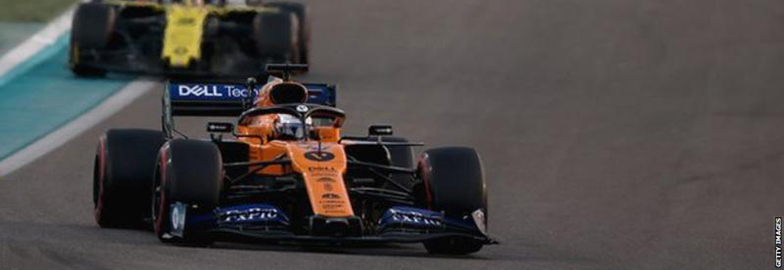Formula 1 teams have unanimously rejected the tyres proposed by supplier Pirelli for the 2020 season.
The Italian company had hoped the new design would be a step forward in plans to introduce less sensitive tyres, on which drivers can push and race harder.
But at a test in Abu Dhabi last week, teams preferred the 2019 tyres.
Pirelli said it was convinced of the changes in the 2020 tyres but understood that other factors were involved.
A spokesman pointed out that the 2020 tyre was a different profile from the 2019 model and the teams would therefore have had to make changes to their cars at what is a very late stage in the design process.
He added that there was only one year left of the current technical regulations before major changes planned for the 2021 season and that as a result teams were reluctant to change their cars for the tyres, when they are already planning for a much bigger change in 2021.
Pirelli said that the solutions used in the 2020 tyres would be among those used in 2021, when wheel sizes will be increased from 13 to 18 inches and lower-profile tyres will be introduced.
The decision means F1 will have to wait at least another year before it can instigate its plan to introduce tyres that are more raceable than those that have been used in recent years.
- Russian Grand Prix promoters ‘confident’ race will go ahead despite sporting ban
- Renault technical director Nick Chester leaves under-performing team
The drivers, under their representative organisation the Grand Prix Drivers’ Association (GDPA), have been pushing for the tyres to be made more durable so they can push flat out and race harder than they have so far been able to in the Pirelli era.
The Pirelli tyres used in F1 since 2011 have a tendency to overheat when pushed hard, which means drivers cannot push flat out or follow another car closely for any significant period of time.
This means races are dominated by tyre management, which means driving to a pre-set pace that keeps the tyres within their temperature window and which is well below the absolute limit of the car.
At some races, drivers cannot even push flat out for a full qualifying lap.
F1 is introducing major rule changes for 2021 with the aim of closing up the field and making overtaking easier, and Pirelli has been tasked with improving its tyres with the same aim.
FIA president Jean Todt said at the season-closing race in Abu Dhabi that the tyres needed to be “addressed for 2021”.
But Pirelli’s attempts to introduce its new durable design for 2020 have suffered setbacks from the start.
Tyres became a major focus of rule changes only during the summer, as discussions on the 2021 rules came to a head at the British Grand Prix.
Ferrari driver Sebastian Vettel was unconvinced by the tyres on his first experience of them at a test in Barcelona before the Japanese Grand Prix in October.
And when all the teams tried them in practice at the United States Grand Prix later that month, the drivers were unanimous in their criticism of them.
Vettel called them a “disappointment” and McLaren’s Carlos Sainz said they felt “very weird and very bad”.
Pirelli F1 boss Mario Isola said at the time that the test in the USA had been less effective than hoped because of the unusually cool conditions in Austin that day.
Haas driver Romain Grosjean, a director of the GPDA, said at the Abu Dhabi test: “If you ask me if I’m very happy about the new tyres and this is going to solve some of the problems – the thermal degradation, sensitivity to following another car – I just have to tell the truth – no, it’s not going to change the problem fully.”
Senior figures in F1 hope the move to 18-inch wheels and lower profile tyres for 2021 will make it easier to design tyres that fit the required criteria.
Testing on the 2021 rubber has already begun – Pirelli completed a two-day test in Abu Dhabi at the weekend with a 2019 Mercedes driven by Williams driver George Russell using 18-inch wheels.
www.bbc.com Andrew Benson Chief F1 writer







